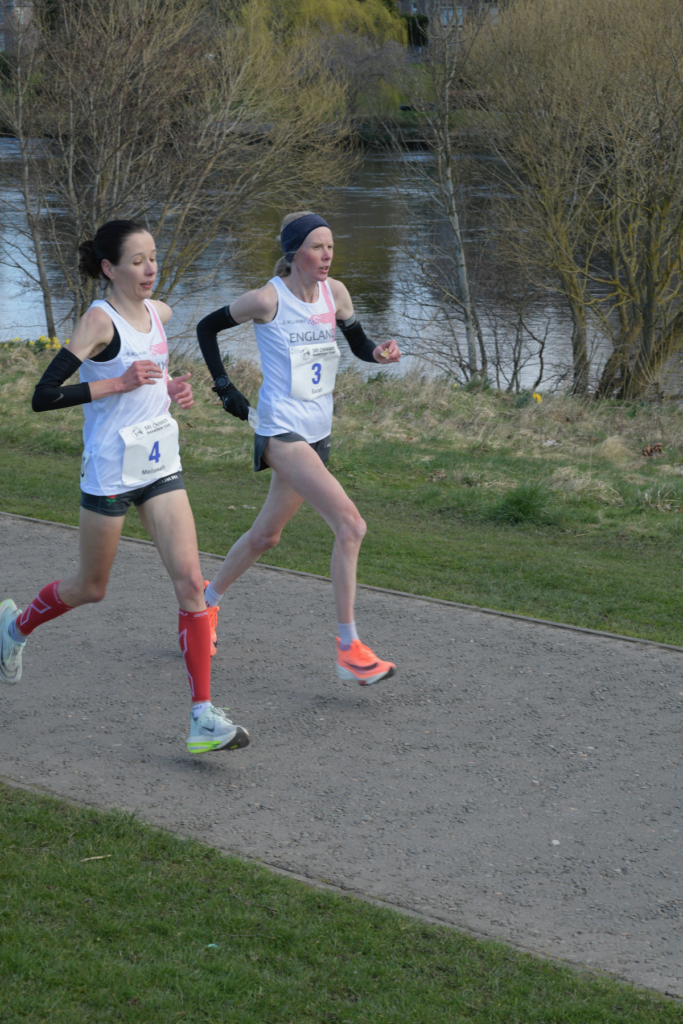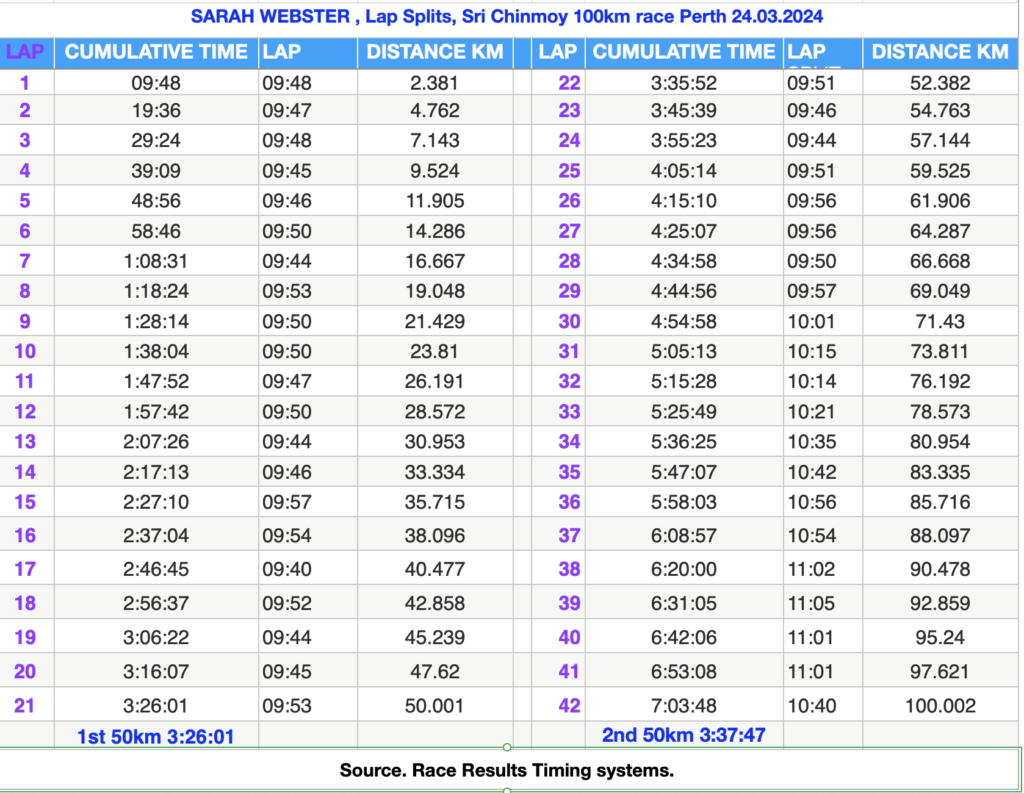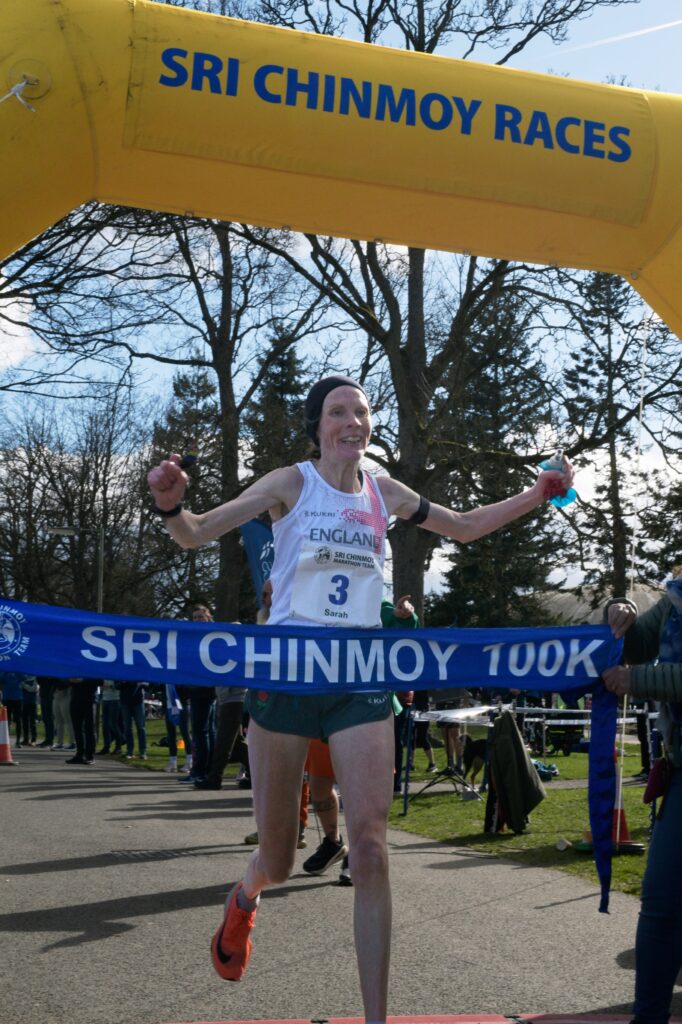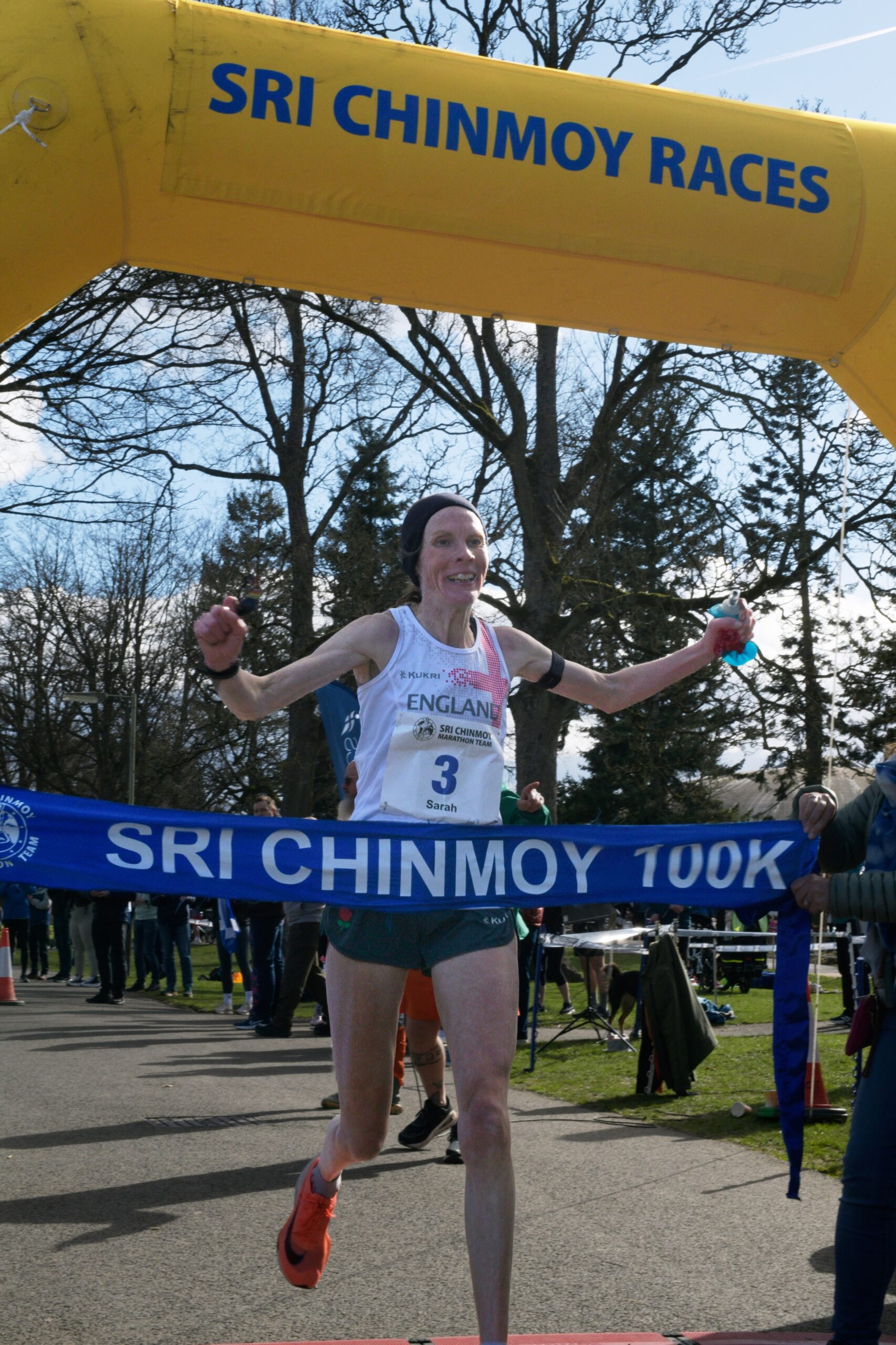Sarah Webster. New UK 100km Champion
Sarah Webster, the new UK 100km champion, ran a new Women’s 100km European record, subject to ratification, when winning the 2024 title at the recent Sri Chinmoy race in Perth, on 24th March. Her time of 7:03:48 is the 5th fastest 100km time ever record by a woman. We caught up with her this week when she had just returned from her gym session.

SW. Yes. I did a light session this morning.
AS. Generally, how has your recovery been in the last ten days or so since the Perth race?
SW. I still have that deep level of tiredness. Hopefully, it’s all just going to fade away. To be honest, the first two months after a hard race, it’s all just a hard slog. I just get on with it.
Early Days running
AS. We will come on to your race soon but firstly,How did you get into running originally?
SW. I ran as a junior and started athletics when I was about eight. I went all the way through until my final year of university. I gave it all up to concentrate on getting my degree. When my daughter was four, she started going to school, and my husband was saying, “I think you should start running again.” And I am saying, “Really? Because you haven’t met me when I was a runner.” So I was thinking, “Do you know what you’re getting yourself into ?” But he was fine and offered his support. My Daughter would go on the bus to school, and she was only four, so I took her on the bus, and then I would run home. That was nice because that was all downhill. Then, in the afternoon, I had to run back up the hill to go and pick her up and come back on the bus with her. It was a good way of starting. It was good motivation. I ran for a year on the road, then switched back to track for a bit and enjoyed a bit of track for a couple of years. I realised I wasn’t going to get any faster with the track work I was doing, so I switched back to the road, which was a bit easier, and gradually upped the distance.
AS. When you were doing track as a junior, what sort of distances were you doing then?
SW. 1500 was my main distance, with the occasional 800, and 3000 metres when I was a bit bigger. But 1500 was always my main one.
AS. That’s interesting because Dougie Selmon has a similar background. He was an 800-meter runner when he was younger. It’s amazing how you both come from that background and have now gravitated to being 100-kilometre champions. How did you gravitate to marathon running?
SW. I think it was just a natural progression that I wanted to try. I’d done a few half marathons, and I didn’t want to do London as my first one.
I wanted a nice smaller, friendly one. Unfortunately, the Isle of Man Marathon has a great hill on each lap. So I thought, no, I don’t want to do the Isle of Man as my first one, so I picked Chester as being convenient, and I absolutely loved it, despite the hill at mile 24.
Commonwealth Games qualification for the Isle of Man.
AS. Then you progress and, living on the Isle of Man, you have Commonwealth Games qualification as a Manx team. How did you become aware of that, and how did you become aware that you could be good enough to be in the frame for running for the Commonwealth Games for the Isle of Man?
SW. Well, after the first marathon, I ran 2:48:48, and at that point, the standard was 2:43:00 for the Isle of Man Commonwealth Games team. I thought five minutes improvement in a marathon was probably achievable, whereas a minute improvement in a 1500 metres, was probably not achievable. The thinking was,” I know what’s achievable, and it’s definitely not the 1500 metres. I might as well go for it in the marathon and see what happens. With all the problems of Covid, and lockdown, I did manage to achieve the qualifying standard and represent the Isle of Man at the Commonwealth Games.
AS. I think it’s fair to say you had an interrupted build-up to that, so you didn’t perform quite as well as you’d like to,
SW. Oh, it was such a shame. I got COVID 10 days before the race,
and the race was just horrible. I don’t know whether it was mental or physical or both with COVID-19, but it was not the race I wanted. The experience was amazing. To be part of the Isle of Man team for the Commonwealth Games was really fun.
AS. If it wasn’t the best experience, it was still a life-defining experience for you. Fast forward a little bit. How did you ever get talked into thinking about running 100k?
Talking herself into running 100km
SW. Getting talked into it was my idea. Before COVID, I had the idea that I could run 50k because I saw the standards for the European 50k championship in 2019. I had the Marathon standard for it. So I was thinking if I can get a marathon standard and run 50k, that’s a start in the ultra world. Starting to look at the England/GB level would be good as well. I didn’t get selected. It was the year Ali Dixon won the title and broke the world record. I didn’t get on the team as there were many faster marathon runners than me.
If COVID hadn’t happened, and with the Commonwealth Games as well. I probably would have done a 50k first, but because of the Commonwealth Games that wasn’t going to happen. After the Commonwealth Games in Birmingham, I took a look at my options.
I also looked at the standards for the English 100k team for the 2023 Anglo Celtic Plate. I had the marathon standards, so I expressed an interest. I wasn’t expecting to get selected, but there was the potential that I could.
AS. How did you adapt your training from marathon to 100K? In your mind, did you feel there was going to be a big transition, or was it just little increments?
SW. I like 100k training better than marathon training. Last year, we cut out two out of three of my speed sessions. I only did one speed session a week with 100km, which as far as I was concerned was lovely. The other sessions were easy running for about an hour and a half every day and then back-to-back long runs at weekends. I would see what fitted in logistically, and I’d do a couple of hours one day, and the other day would be a bigger one, so between three and four hours, depending on what I was doing, how my legs felt etc. I think the back-to-back runs worked.
They definitely helped. That was probably the biggest change. This year, we did it slightly differently. In 2023, I ran the Seville Marathon six weeks before the 100km, so I had done more speed training for my marathon block. This year, we didn’t run Seville, which was good, because I didn’t have a marathon in my life, but we decided we would put in another speed session. I did a marathon pace and a rep session, and then marathon paces every other week with reps every week. Then the rest of the time was back to the easy running and the back-to-back. That was probably the only change that I made. Your mileage inevitably creeps up because you’re doing 12 miles a day plus.
It was up to about 100 miles a week on average for this training block.
AS. Your body was coping with that?
SW., yes.
Getting the work, life, training balance.
AS. What is your work-family situation? You have other commitments, obviously.
SW. Yes, I’m very lucky at the moment. My current job fits around my training. They allowed me to pick what hours I wanted to do. So I usually train in the morning and work in the afternoons. It’s not quite that simple, but I get most of my training done in the mornings, which is a massive difference. So yes, I’m knackered for work, but I don’t really care. That’s made a big difference.
AS, For the benefit of those who don’t know, tell people what your work is.
SW. I’m a vet.
AS. Seems that champion distance runners and being a vet are common themes at the moment.
SW. Yes, there are quite a few of us, aren’t there?
First 100km race at Craigavon 100km 2023.
AS. Going into Craigavon last year, in the 100k in Northern Ireland, you were a bit of an unknown, and you surprised a lot of people. Did you have a plan that you were aiming to run that fast, or was it just the way the race evolves?
AS. No, the plan was, number one priority to finish, number two priority was to win, and number three priority was to break the British record, which at that point was 7:27:19. I decided that was entirely doable. I don’t think having talked to me once, Robbie was very convinced by this statement. ( Robbie Britton the England team manager,) Anyway, I got off the phone with him, and I said to my coach, “Robbie doesn’t think I can do it.” And to me, that was a red rag to a bull. So nobody had any idea, including me, that I would ever go anywhere near as fast as I did last year. That was a total surprise including for me.
Having said that, in the build up to the race and on the weekend, Robbie and all the England support were incredibly supportive not just to me but all the team. The entire team atmosphere was geared to helping us all get the best out of ourselves?
AS. Watching that race from the Scotland support tent in Northern Ireland, we were thinking that this could go either way. Either you’re going to do something sensational, or it’s all going to fall apart after about 40 miles.
People began to realise, there was something impressive going on here. It was quite astonishing, what we were seeing happening before us. And yes, you did 7 hours 3 minutes 40 seconds, beating Caroline Hunter-Rowe’s GB record by over 20 minutes. That was a good record, set by Caroline when she won the IAU world 100km title, in a close finish, by 20 seconds in 1993.
It also broke the European record, but for technical reasons, as we all know, wasn’t ratified as there was no drug testing available after the race. But it was the fastest time ever run by a European athlete. How did you plan to follow that up in Perth?
The plan for Perth 100km race
SW. I really wanted to run under seven hours. That was the aim because the world record I know is never going to be achievable for me. That would have to be a massive jump in standard.
NOTE: The current women’s world 100km record is held by Tomoe Abe of Japan, at 6:33:11.
Breaking seven hours would have put me number two on the all-time list and got me a proper European record. So that was the aim. Everything was there on paper. Training had gone really well. It was there, but it just wasn’t going to happen on the day, unfortunately. I held the pace though to 75km but faded slightly after that. Thank goodness, at least I managed to scrape in under 7:04 and get the European record.
Sarah Websters 100km lap splits from her Perth 100km race
Sarah Webster’s lap splits from Perth make interesting reading. She was very consistent in the first half reached in 3:26:01 and maintained that through to around 70km.Over the final 30km, although slowing gradually, she closed well to dip under the European record, previously held by Florianne Hot of France with 7:04:03, by 15 seconds.
Her overall average pace was approximately 6 mins 48 seconds a mile or 4 minutes 12 seconds per kilometre. Melissah Gibson and Julia Davies who ran 7:13:23 and 7:25:48, respectively are now 2nd and 3rd on the All-Time GB rankings.

AS. At one point, we thought you might go under seven hours. Do you think that is still possible in the right conditions?
SW, Well, part of me feels like coming back to the Anglo-Celtic Plate to try and run sub-7. Perth this year although good, wasn’t the race I wanted on the day.
If I am lucky enough to get selected for the World 100km Championship in December, I know the heat and humidity will not be conducive to fast times. Next year’s ACP will be a better chance to achieve it.
AS. In terms of your experience from your first 100K at Craigavon, to the second one, just recently in Perth, what lessons did you learn from the first one that maybe helped or didn’t help?
SW, At Craigavon, what mainly went was the core. I was doubled over by the end because I was so knackered. So, my strength and conditioning coach and I worked a lot on my back strength and some core strength. So that I felt went much better, definitely felt a lot stronger. The Perth course was better because the laps are shorter, which means you can get into the pace quicker and more able to stay at that pace, whereas with longer loops, the 5k loops, you’re much more reliant on your mile markers rather than your loop markers. So it’s okay. Craigavon was what it was, but I liked Perth. , I was very dizzy by the last lap at Craigavon, so the fueling definitely hadn’t been enough. My fuelling in the race was much better in Perth. For me, what went wrong in Perth, was I don’t think I drank enough pre-race. I was so fixated on getting the carbs in a couple of days before that I kind of forgot about the fluids. Then about halfway through the race, I was getting really thirsty and then I got cramps from about five hours in. The rest of me was fine and the rest of me was like. ” Come on you can go faster than this and the legs were telling me NO! Because if you go faster you’re not going to go anywhere, you’re just going to have to run at this pace” which was slightly frustrating.
Looking ahead. What’s next for Sarah?
AS. Looking ahead, if you gain selection for India, you’ve got all summer to prepare for another 100k in December. Are there any other races you’re planning over the summer?
SW.Well, I’m entered in the Gloucester Track races. My coach tells me I’m absolutely not doing 24 hours there. The plan is to target one of the shorter intermediate distances and see if I can break a record or two.
AS. We wish you well with that. Looking even further ahead, obviously, this year is mapped out but would you like to do any of the bigger races abroad like Comrades or maybe look at one of the big 100-milers overseas?
SW. Comrades has been on my bucket list since I was about 20. I went and saw the finish in Pietermaritzburg, and it was incredible. I swore then that Comrades and the London Marathon were the two races I wanted on my bucket list. London, I’ve run twice now. I possibly would have done Comrades this year, but it clashes with my daughter’s GCSE exams. So it was scrapped and I had the opportunity to go back to the Anglo-Celtic plate to try and get the faster time.so Comrades may happen in 2025.
I would love to do a 100-mile race. I haven’t thought about shorter split times in the track race, so I don’t know what’s out there in terms of world 100-mile races. But if one came up on the radar, I probably would jump at the opportunity.
AS. I mean, Your coach, David,(David Leach), like any coach, will look at you and ask, “What are your strengths? What are your weaknesses? What is your best distance? What’s your best surface?” Have you ever talked about running on the trails and doing some trail races?
SW. I am useless at navigation. I get lost on the Isle of Man. If you can get lost in the Isle of Man, it’s not good. I find it ironic, that I’m a qualified coach to lead athletes on the fells, but I would be a complete liability myself. So, I don’t do anything involved with navigation, and I really, really don’t like anything involving mud. Even off-road tracks that break your rhythm are hard for me. For quite a few years, Dave was saying, “You need to do some cross-country. It’s really good for you.” and that’s what I tell my athletes as well. So, not a chance in hell I will get seriously into trails.

Best Advice for anyone thinking of trying 100km on the road?
AS. Finally, you alluded to this a little bit at the start, but there will be a lot of marathon runners out there looking at what you’ve done, and looking at what Dougie and others have done, who have been very competent marathon runners. They might be thinking, “Hmm. I wonder if I could do 100K.” What are the best one or two bits of advice you could give to someone who’s thinking of putting 100K on their radar? Maybe a few years down the road, but how do they have to adapt looking forward?
SW. I think, for me, going up in distance is as much a mental thing as much as a physical thing. You don’t mind going up in distance.
Standard Marathon advice is not to run over 20 miles in training.
However, I’ve always upped that. I’ve done 26 miles, even a 28 miler training for a marathon, and never found it a problem. So it wasn’t much further to make that step to 50k. It’s only five miles further than the marathon, so what are you worrying about? I think if you can’t make that small leap, you’re not ready for it.
There is no reason why you couldn’t. But it’s upping that distance.
Then I think it’s what you enjoy. If you don’t enjoy running long distances, there’s no point in doing it. Go and do the shorter stuff. Nobody says anybody has to run a marathon or has to run an ultra. Then, as you say, what type of ultra do you want to run?I happen to be quite good at running round and round in circles on tarmac, but other people want to get out on the trails. They don’t enjoy running on the road. They want that freedom of just being in the hills by themselves, and that’s brilliant. That’s why I think ultra-running is so popular. People feel they can escape into the hills.
And in a way, pace is not so important on the hills. It’s more just getting out and getting through the distance and enjoying it.
AS. In closing, just because it’s topical, as one champion who is also a vet to another, in some ways. It’s been impossible to avoid hearing and reading about what Jasmin achieved at the Barkley.
Note:In case you have been on a retreat somewhere recently Jasmin Paris became the first woman to complete the 100 mile Barkley marathon in Tennessee recently.
Can you sum up how you feel about Jasmin breaking so many barriers? I don’t think Jasmin’s ever run even a 10k on the road, but she’s obviously a free-spirited mountain runner and always has been. Sum up how you look at that achievement.
SW. I think she’s just incredible. People are asking me, oh, you could do that. And I’m like, no, I couldn’t. What she has done is just incredible. It may not be as fast a pace as I am running, but the navigation, the lack of sleep, that tough terrain. Hats off to her. She is awesome. I have no inspiration to go and do it myself, but yes, she is awesome! And I very much admire her from afar.
AS.That’s great, and a good place to finish. Thanks ever so much for your time.
SW. Thank you very much. Thank you for all the hard work you did behind the scenes to organise the race at Perth. I really appreciate it.
FOR Further info on the Sri Chinmoy 100k/50k ultras
Watch a Short video with drone footage by Stuart Ross of Stuart Ross Media HERE
Full results from the Sri Chinmoy 100k/50 ultra races HERE
Our Blog on all the records that fell at Perth is HERE
PLEASE SHARE!
Thanks for reading . If you have enjoyed this post, do see our other ones HERE
If you have a comment, please feel free to add it below.
If you are inspired by this or think someone else you know will be, please do what you have to do by sharing. You all know how these things work by now:-) You can also follow me on Twitter and Instagram @tarittweets
Sign up to receive our newsletter alerting you to new posts
Adrian Tarit Stott.
The author is a former GB 24 hour ultra international with over 100 ultra race completions. He has also been involved organising ultra distance races for over 30 years. Still an active recreational runner, he is currently a member of UKA’s Ultra Running Advisory Group (URAG) and part of the selection and team management for both Scottish and GB ultra teams.He is also a freelance writer in his spare time, contributing articles and reports to several websites and magazines including Athletics Weekly and Irunfar.
